Sacraments
Text taken from USCCB.org
The visible reality we see in the Sacraments is their outward expression, the form they take, and the way in which they are administered and received. The invisible reality we cannot “see” is God’s grace, his gracious initiative in redeeming us through the death and Resurrection of his Son. His initiative is called grace because it is the free and loving gift by which he offers people a share in his life, and shows us his favor and will for our salvation. Our response to the grace of God’s initiative is itself a grace or gift from God by which we can imitate Christ in our daily lives.
We recognize that the Sacraments have a visible and invisible reality, a reality open to all the human senses but grasped in its God-given depths with the eyes of faith. When parents hug their children, for example, the visible reality we see is the hug. The invisible reality the hug conveys is love. We cannot “see” the love the hug expresses, though sometimes we can see its nurturing effect in the child.
The saving words and deeds of Jesus Christ are the foundation of what he would communicate in the Sacraments through the ministers of the Church. Guided by the Holy Spirit, the Church recognizes the existence of Seven Sacraments instituted by the Lord.
Through the Sacraments, God shares his holiness with us so that we, in turn, can make the world holier.
Baptism & RCIA
By Baptism we become members of the Church, the Body of Christ.
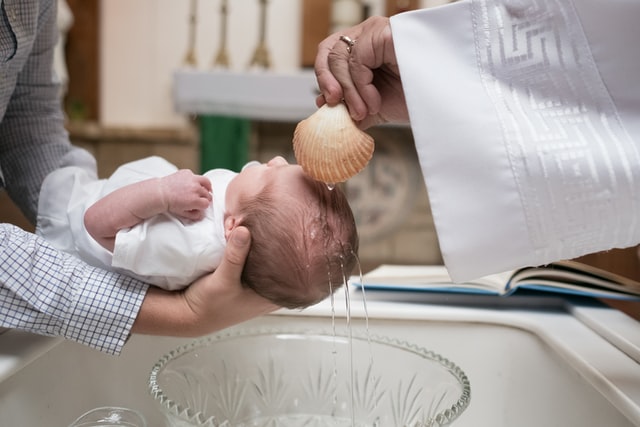
The origin and foundation of Christian Baptism is Jesus. Before starting his public ministry, Jesus submitted himself to the baptism given by John the Baptist. The waters did not purify him; he cleansed the waters. . . . Jesus did not need to be baptized because he was totally faithful to the will of his Father and free from sin. However, he wanted to show his solidarity with human beings in order to reconcile them to the Father. By commanding his disciples to baptize all nations, he established the means by which people would die to sin – Original and actual – and begin to live a new life with God.
In Baptism, the Holy Spirit moves us to answer Christ’s call to holiness. In Baptism, we are asked to walk by the light of Christ and to trust in his wisdom. We are invited to submit our hearts to Christ with ever deeper love.
Please Note: Parents are asked to schedule an appointment with one of the priests early in the pregnancy.
Parents are reminded that the selection of godparents must be made according to regulations specified in Canon Law. Eligibility letters for godparents should be submitted no later than the Friday prior to the baptism.
Baptisms will take place after the 11:30 am Mass on the first and second Sundays of the month. Pre-Baptism Workshops take place on the last Tuesday of the month at 7:00 pm in the Religious Education building. Registration for workshops can be made by calling the parish office.
To schedule a baptism, please contact our rectory
Confirmation
In the Sacrament of Confirmation, the baptized person is "sealed with the gift of the Holy Spirit" and is strengthened for service to the Body of Christ.
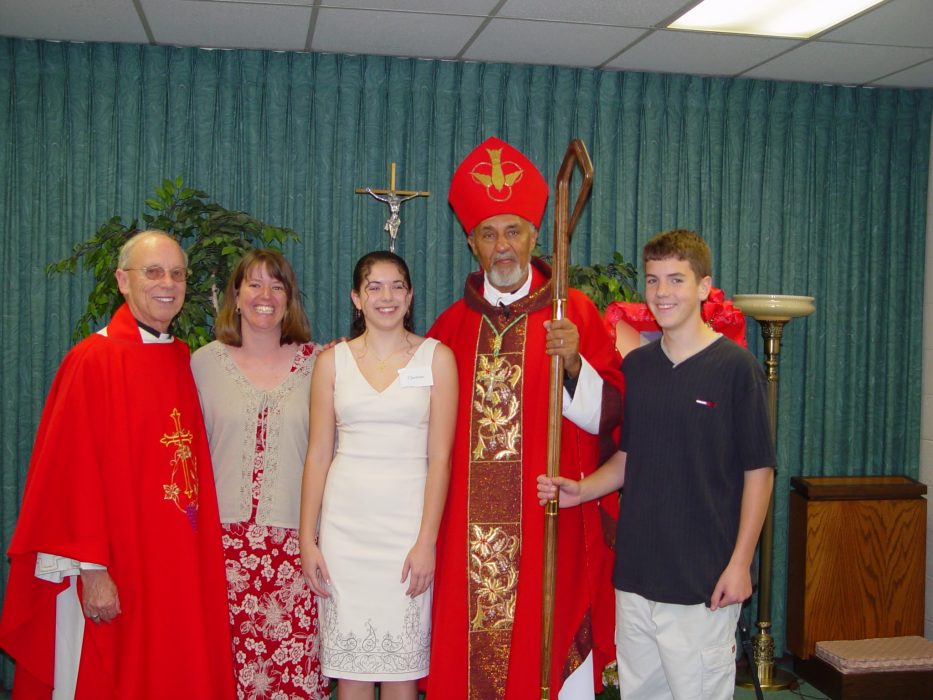
The prophets of the Old Testament foretold that God’s Spirit would rest upon the Messiah to sustain his mission. Their prophecy was fulfilled when Jesus the Messiah was conceived by the Spirit and born of the Virgin Mary. The Holy Spirit descended on Jesus on the occasion of his baptism by John. Jesus’ entire mission occurred in communion with the Spirit. Before he died, Jesus promised that the Spirit would be given to the Apostles and to the entire Church. After his death, he was raised by the Father in the power of the Spirit.
Confirmation deepens our baptismal life that calls us to be missionary witnesses of Jesus Christ in our families, neighborhoods, society, and the world. . . . We receive the message of faith in a deeper and more intensive manner with great emphasis given to the person of Jesus Christ, who asked the Father to give the Holy Spirit to the Church for building up the community in loving service.
For information about being confirmed, please contact our Parish Religious Education Director
The Eucharist / The Mass
"Jesus said to them, 'I am the bread of life; whoever comes to me will never hunger, and whoever believes in me will never thirst.'" - John 6:35
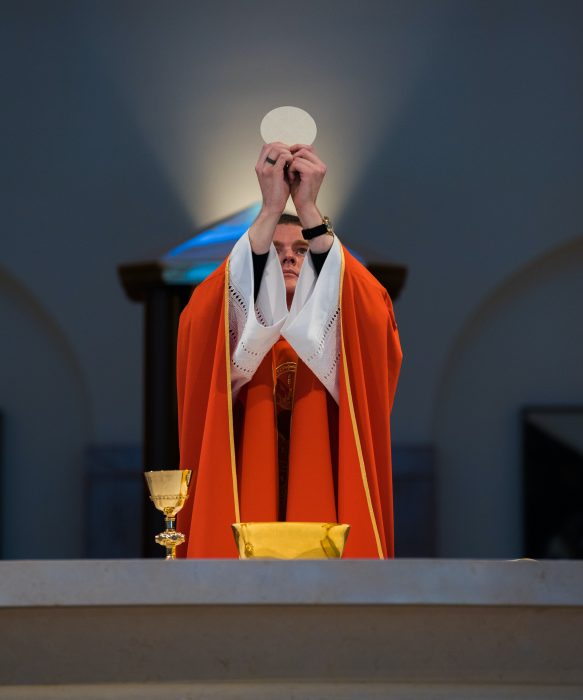
Rediscovering the Mass. Are you seeking to rediscover your friendship with Jesus? Haven’t been to Mass in a while and wondering where to start? Start by getting to know Jesus again through prayer. It doesn’t matter how long its been since you have been to Mass. You are always invited to encounter Jesus in the Mass.
For information about First Communion please contact our Parish Religious Education Director
Penance
Penance is an experience of the gift of God's boundless mercy.
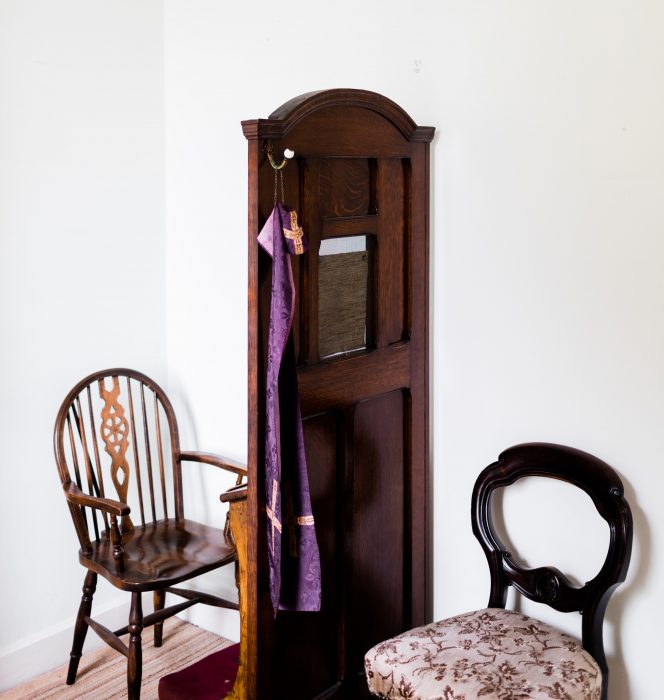
Not only does the Sacrament of Penance free us from our sins but it also challenges us to have the same kind of compassion and forgiveness for those who sin against us. We are liberated to be forgivers. We obtain new insight into the words of the Prayer of St. Francis: “It is in pardoning that we are pardoned.”
Jesus entrusted the ministry of reconciliation to the Church. The Sacrament of Penance is God’s gift to us so that any sin committed after Baptism can be forgiven. In confession we have the opportunity to repent and recover the grace of friendship with God. It is a holy moment in which we place ourselves in his presence and honestly acknowledge our sins, especially mortal sins. With absolution, we are reconciled to God and the Church. The Sacrament helps us stay close to the truth that we cannot live without God. “In him we live and move and have our being” (Acts 17:28).
For information about your First Confession please contact our Parish Religious Education Director
Anointing of the Sick
Jesus came to heal the whole person, body and soul.
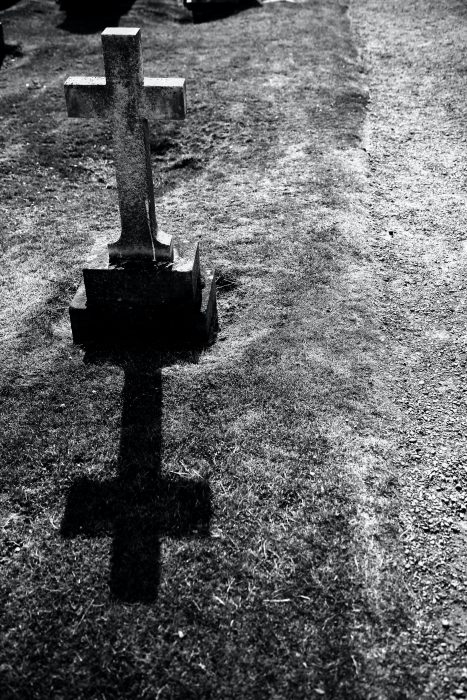
In the Church’s Sacrament of Anointing of the Sick, through the ministry of the priest, it is Jesus who touches the sick to heal them from sin – and sometimes even from physical ailment. His cures were signs of the arrival of the Kingdom of God. The core message of his healing tells us of his plan to conquer sin and death by his dying and rising.
The Rite of Anointing tells us there is no need to wait until a person is at the point of death to receive the Sacrament. A careful judgment about the serious nature of the illness is sufficient.
When the Sacrament of Anointing of the Sick is given, the hoped-for effect is that, if it be God’s will, the person be physically healed of illness. But even if there is no physical healing, the primary effect of the Sacrament is a spiritual healing by which the sick person receives the Holy Spirit’s gift of peace and courage to deal with the difficulties that accompany serious illness or the frailty of old age.
Anointing of the Sick and Communion Calls: The rectory may be called at any time for the Sacrament of the Sick and for arrangements to visit the sick or elderly with the Eucharist. Our local hospitals also have a Catholic chaplain available.
To schedule an anointing of the sick, please contact our rectory
Matrimony
Man and woman were created for each other.
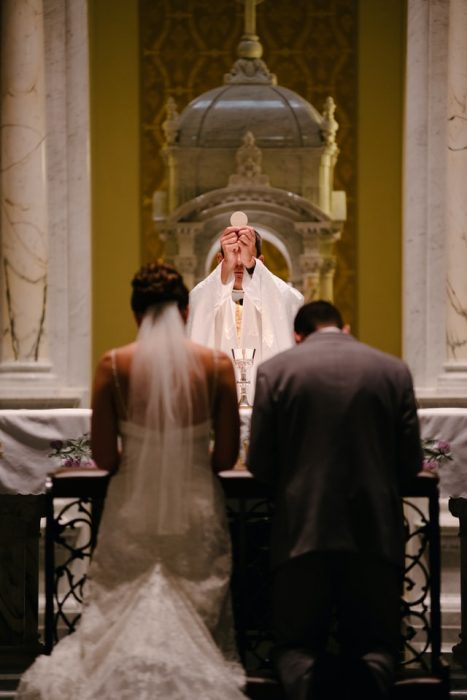
Sacred Scripture begins with the creation and union of man and woman and ends with “the wedding feast of the Lamb” (Rev 19:7, 9).
Scripture often refers to marriage, its origin and purpose, the meaning God gave to it, and its renewal in the covenant made by Jesus with his Church. By their marriage, the couple witnesses Christ’s spousal love for the Church. One of the Nuptial Blessings in the liturgical celebration of marriage refers to this in saying, “Father, you have made the union of man and wife so holy a mystery that it symbolizes the marriage of Christ and his Church.”
The Sacrament of Marriage is a covenant, which is more than a contract. Covenant always expresses a relationship between persons. The marriage covenant refers to the relationship between the husband and wife, a permanent union of persons capable of knowing and loving each other and God. The celebration of marriage is also a liturgical act, appropriately held in a public liturgy at church. Catholics are urged to celebrate their marriage within the Eucharistic Liturgy.
Marriage: Ideally, engaged couples should contact the Parish Office one year prior to the scheduled date.
To schedule a wedding, please contact our rectory
Holy Orders
"Here I am, send me." (Is 6:8)
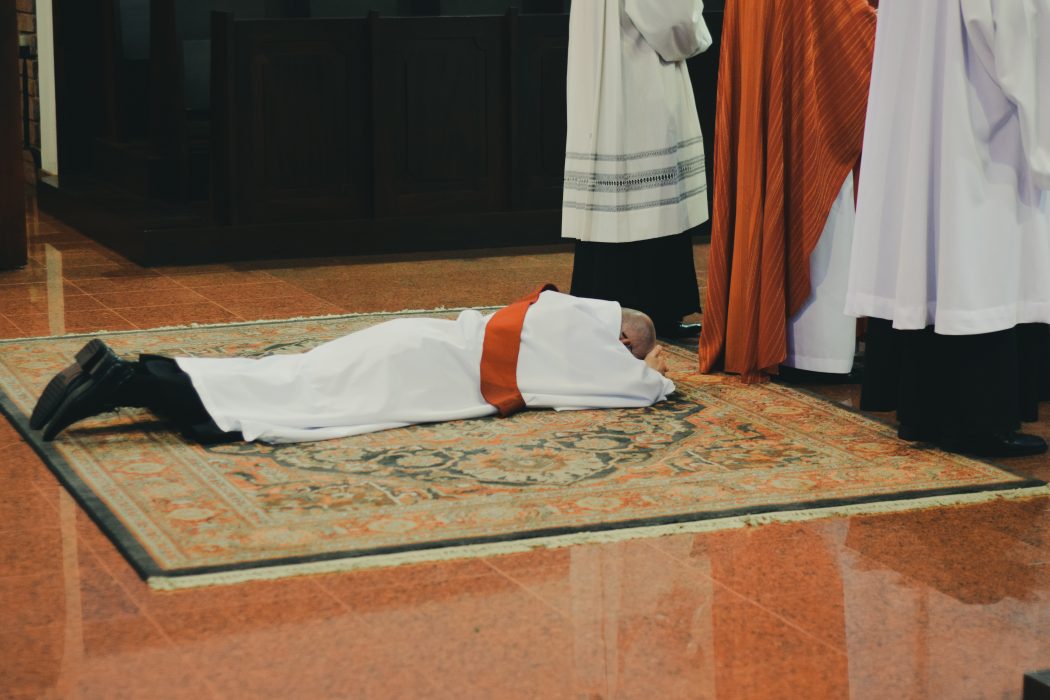
For information about
joining the priesthood,
either contact our rectory or
Visit our diocese’s vocation website
From the moment of Jesus’ conception in the womb of Mary until his Resurrection, he was filled with the Holy Spirit. In biblical language, he was anointed by the Holy Spirit and thus established by God the Father as our high priest. As Risen Lord, he remains our high priest. . . . While all the baptized share in Christ’s priesthood, the ministerial priesthood shares this through the Sacrament of Holy Orders in a special way.
Ordination to the priesthood is always a call and a gift from God. Christ reminded his Apostles that they needed to ask the Lord of the harvest to send laborers into the harvest. Those who seek priesthood respond generously to God’s call using the words of the prophet, “Here I am, send me” (Is 6:8). This call from God can be recognized and understood from the daily signs that disclose his will to those in charge of discerning the vocation of the candidate.
